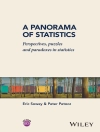It is a great privilege and pleasure to write a foreword for a book honor ing Wolfgang Gaul on the occasion of his sixtieth birthday. Wolfgang Gaul is currently Professor of Business Administration and Management Science and the Head of the Institute of Decision Theory and Management Science, Faculty of Economics, University of Karlsruhe (TH), Germany. He is, by any measure, one of the most distinguished and eminent scholars in the world today. Wolfgang Gaul has been instrumental in numerous leading research initia tives and has achieved an unprecedented level of success in facilitating com munication among researchers in diverse disciplines from around the world. A particularly remarkable and unique aspect of his work is that he has been a leading scholar in such diverse areas of research as graph theory and net work models, reliability theory, stochastic optimization, operations research, probability theory, sampling theory, cluster analysis, scaling and multivariate data analysis. His activities have been directed not only at these and other theoretical topics, but also at applications of statistical and mathematical tools to a multitude of important problems in computer science (e.g., w- mining), business research (e.g., market segmentation), management science (e.g., decision support systems) and behavioral sciences (e.g., preference mea surement and data mining). All of his endeavors have been accomplished at the highest level of professional excellence.
Mục lục
Data Analysis.- Optimization in Symbolic Data Analysis: Dissimilarities, Class Centers, and Clustering.- An Efficient Branch and Bound Procedure for Restricted Principal Components Analysis.- A Tree Structured Classifier for Symbolic Class Description.- A Diversity Measure for Tree-Based Classifier Ensembles.- Repeated Confidence Intervals in Self-Organizing Studies.- Fuzzy and Crisp Mahalanobis Fixed Point Clusters.- Interpretation Aids for Multilayer Perceptron Neural Nets.- An Unfolding Scaling Model for Aggregated Preferential Choice Data.- Model-Based Clustering — Discussion on Some Approaches.- Three-Way Multidimensional Scaling: Formal Properties and Relationships Between Scaling Methods.- Empirical Approach as a Scientific Framework for Data Analysis.- Asymmetric Multidimensional Scaling of Relationships Among Managers of a Firm.- Aggregation of Ordinal Judgements Based on Condorcet’s Majority Rule.- ANOVA Models with Generalized Inverses.- Patterns in Search Queries.- Performance Drivers for Depth-First Frequent Pattern Mining.- On the Performance of Algorithms for Two-Mode Hierarchical Cluster Analysis — Results from a Monte Carlo Simulation Study.- Clustering Including Dimensionality Reduction.- The Number of Clusters in Market Segmentation.- On Variability of Optimal Policies in Markov Decision Processes.- Decision Support.- Linking Quality Function Deployment and Conjoint Analysis for New Product Design.- Financial Management in an International Company: An OR-Based Approach for a Logistics Service Provider.- Development of a Long-Term Strategy for the Moscow Urban Transport System.- The Importance of E-Commerce in China and Russia — An Empirical Comparison.- Analyzing Trading Behavior in Transaction Data of Electronic Election Markets.- Critical Success Factors for Data Mining Projects.- Equity Analysis by Functional Approach.- A Multidimensional Approach to Country of Origin Effects in the Automobile Market.- Loyalty Programs and Their Impact on Repeat Purchase Behaviour: An Extension on the “Single Source” Panel Behavior Scan.- An Empirical Examination of Daily Stock Return Distributions for U.S. Stocks.- Stages, Gates, and Conflicts in New Product Development: A Classification Approach.- Analytical Lead Management in the Automotive Industry.- Die Nutzung von multivariaten statistischen Verfahren in der Praxis – Ein Erfahrungsbericht 20 Jahre danach.- Heuristic Bundling.- The Option of No-Purchase in the Empirical Description of Brand Choice Behaviour.- kla R Analyzing German Business Cycles.












